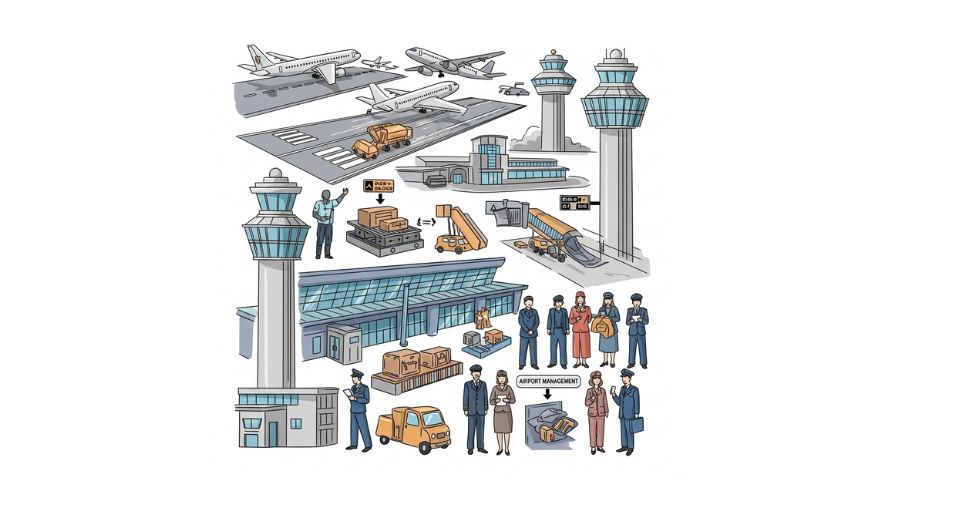
Jun 11, 2025

The global airport management market report from Metastat Insight tackles the significance of the industry in operating efficient airports globally. This industry includes developing infrastructures, resource development, security management, and passenger traffic control. Being the critical points of passage for passengers and cargo alike, airports depend on effective management methods for the ever-growing air travel demand while ensuring safety and efficiency.
The global airport management market has seen a change in recent years due to advancements in technology, changing passenger preferences, and adopting sustainable measures. Smart technologies have enhanced airport operations greatly. Technologies such as automatic check-in and sophisticated baggage handling systems are designed to provide smoothness and efficiency in passenger experience. Also, the deployment of artificial intelligence, IoT-based solutions, and predictive analytics expedited resource management and operational planning. Such a technological innovation is a narrative of how the industry evolves to meet prevailing challenges and takes the lead in developing trends. One of the most significant things about the global airport management market is its emphasis on improved customer satisfaction as it handles operational issues.
Now, advanced systems for improved crowd management with lesser delays are being greatly invested in by airport operators to provide better passenger experiences. At the same time, proper security measures with an emphasis on data security and networked systems integrity must be guaranteed to minimize threats of harmful attacks by possible hackers in order to build confidence among airport patrons. As information-intensive industries, airports certainly require more robust security architectures for risk management. Another of the notable trends in the global airport management market is sustainability, which is in line with environmental obligations.
The necessity for the industry to cut carbon footprint has compelled the aviation industry to embrace and incorporate greenery into airport management. Renewable power sources and energy-efficient facilities will be included in planning as well as in day-to-day operations of airports, and waste management initiatives will minimize waste. Environmental protection is on the agenda because it fits very nicely into an international effort at long-term sustainability.
Moreover, the global airport management market is driven by its flexibility to accommodate regional and cultural diversity. Airports across different parts of the world must be responsive to the multi-dimensional needs of passengers and regulatory settings. For example, airports serving cities experience congestion and space issues, to which they need to provide creative design and operating solutions.
In contrast, airports in less populous areas concentrate on connectivity and facilitation to the local economy. It emphasizes, in addition, that the industry evolves and, as such, aligns suitable solutions towards those unique situations for it to keep making airports portals for the whole world. The global airport management market cannot be oblivious to the significance of coordination. Airports are a system, dependent on airlines, regulatory bodies, technology solution providers, and local administrations working together. It is this coordination that allows service integration-from air traffic control to ground handling-so that the airport functions as a single system. Efficient delivery of these services demands clear communication and coordination among the stakeholders in order to be operationally efficient. The global airport management market has been tried and tested in recent years, particularly during times of uncertainty like the COVID-19 pandemic. The industry proved to be highly resilient by adopting stringent safety protocols and innovative responses that were able to regain confidence in air travel. What was learned during those trying times has further enhanced the need for effective crisis management measures, thereby enabling airports to deal with unexpected disruptions effectively.
As the global airport management market progresses, its future is full of growth and innovation potential. New technologies such as self-driving cars for ground handling and biometric authentication technology have the potential to change the airport experience. These developments will likely make the airport experience more efficient, reduce the cost, and raise passenger satisfaction. Nevertheless, the industry will develop depending on its capacity to address technological innovation with sustainable practices and human touch.
The global airport management market, according to Metastat Insight, is a vibrant and integral part of the aviation world. It will keep evolving and transforming to integrate technology updates, sustainable practices, and local demands. As the globe speeds into its future, its cooperation, creativity, and resilience will shape the image of air travel in all corners of the globe.
Drop us an email at:
Call us on:
+1 214 613 5758
+91 73850 57479